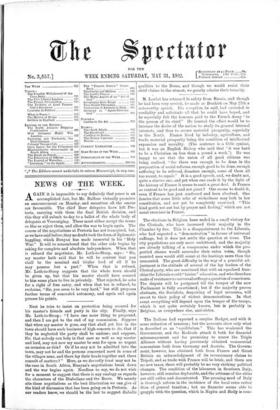M. Loubet has returned in safety from Russia, and though
he had been very seasick, he made at Dunkirk on May 27th a noteworthy speech. His reception, he said, had exceeded in cordiality and solicitude all that he could have hoped, and he especially felt the honours paid to the French Army " in the person of its chief." He trusted the effect would be to increase the desire of the nation to study its general internal interests, and thus to secure material prosperity, especially in the North. France lived by industry, agriculture, and trade, material prosperity being the condition of intellectual expansion and morality. (The sentence is a little cynical, but it was an English Bishop who said that "it was hard to be a Christian on less than a pound a week.") He was happy to see that the union of all good citizens was being realised, " for there was enough to be done in the preparation of social reforms, enough good to be done, enough suffering to be relieved, disasters enough, some of them all too recent, to repair." It is a good speech, and, we doubt not, quite a sincere one, and yet when one reads it by the light of the history of France it seems to omit a great deal. Is France so content to be good and not great ? One seems to doubt it, even if France has just confessed and been absolved. One fancies that some little relic of wickedness may lurk in her constitution, and not yet be completely exorcised. " This kind goeth not out but by prayer and fasting," which are not usual exercises in France.










































